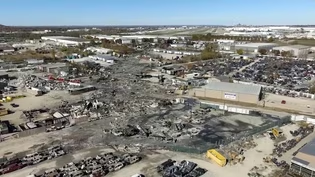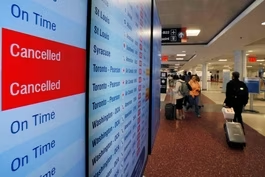
Rural U.S. hospitals compete for billions in federal funding
Clip: 11/8/2025 | 6m 44sVideo has Closed Captions
Struggling rural hospitals compete for billions of dollars in federal funding
Health systems in rural America are struggling. Many are losing money and over the past decade, more than 100 have closed. To address Medicaid shortfalls in the “One Big Beautiful” budget bill, Congress approved a $50 billion rural health transformation fund. Ali Rogin speaks with National Rural Health Association chief policy officer Carrie Cochran-McClain about how states hope to use the money.
Problems playing video? | Closed Captioning Feedback
Problems playing video? | Closed Captioning Feedback
Major corporate funding for the PBS News Hour is provided by BDO, BNSF, Consumer Cellular, American Cruise Lines, and Raymond James. Funding for the PBS NewsHour Weekend is provided by...

Rural U.S. hospitals compete for billions in federal funding
Clip: 11/8/2025 | 6m 44sVideo has Closed Captions
Health systems in rural America are struggling. Many are losing money and over the past decade, more than 100 have closed. To address Medicaid shortfalls in the “One Big Beautiful” budget bill, Congress approved a $50 billion rural health transformation fund. Ali Rogin speaks with National Rural Health Association chief policy officer Carrie Cochran-McClain about how states hope to use the money.
Problems playing video? | Closed Captioning Feedback
How to Watch PBS News Hour
PBS News Hour is available to stream on pbs.org and the free PBS App, available on iPhone, Apple TV, Android TV, Android smartphones, Amazon Fire TV, Amazon Fire Tablet, Roku, Samsung Smart TV, and Vizio.
Providing Support for PBS.org
Learn Moreabout PBS online sponsorshipJOHN YANG: Health systems in rural America are struggling.
Many are losing money, and over the past decade, more than 100 have closed.
During the debate over the one big, beautiful budget bill, some lawmakers express concern that Medicaid cuts would threaten rural health systems, which rely on those payments to keep their doors open.
SEN.
SUSAN COLLINS (R) Maine: Rural providers, especially our rural hospitals and nursing homes, are under great financial strain right now.
When these facilities close their doors, the people they serve are often left behind without access to health care.
JOHN YANG: To address those Medicaid shortfalls, Congress approved one of the single biggest investments in rural health, a $50 billion rural health transformation fund.
Applications for the fund were due this week.
Ali Rogin spoke with Carrie Cochran-McClain, Chief Policy Officer for the National Rural Health Association, about how states hope to use the money.
ALI ROGIN: Carrie welcome to the program.
First, can you remind us why this rural Health Fund was included in this budget bill?
CARRIE COCHRAN-MCCLAIN, Chief Policy Officer, National Rural Health Association: Well, when we first started talking about the changes to Medicaid, that would have significant impact on the not only coverage of individuals living across the country, but the providers who care for them.
So as the analysis and the debate continued in Congress, we realized that rural hospitals would be disproportionately impacted.
Given that about half, if not a little more, of the rural hospitals in this country operate with negative margins, they really don't have the room to take additional cuts that were being proposed in the Medicaid changes.
So, Congress developed the Rural Health Transformation Program, which was really initially discussed as a way to offset some of the reductions in funding and reimbursement that these rural hospitals were intending or will be receiving.
ALI ROGIN: So this funding is $50 billion over five years.
Half of that funding is distributed evenly among the states.
The other half is open to these applications.
I want to play for you what Centers for Medicare and Medicaid Director Mehmet Oz said recently about what he's hoping to see in these applications.
DR.
MEHMET OZ, Administrator, Centers for Medicare and Medicaid Service: We're not talking about paying bills and, you know, rounding the edges.
We want transformative big ideas that will dramatically change our expectations of the rural health care system.
ALI ROGIN: So how does that match up with the challenges that the rural health care system is facing and where the money would best help that system?
CARRIE COCHRAN-MCCLAIN: We really have decades of minimal margins, not a lot of funding that has kept rural America from moving forward with some of the other transformation we're seeing in the healthcare system.
This funding is an amazing once in a lifetime opportunity to kind of even that playing field and help rural America move forward in addressing a lot of those really tough challenges we see in our health outcomes and life expectancies.
However, our concern is while this money is great and a very important step forward, we still need the day to day reimbursement to be able to pay these providers for the services they're giving.
ALI ROGIN: And to that point about reimbursements, many of the lawmakers when they were debating this bill, including Republicans Susan Collins of Maine, Josh Hawley of Missouri, they said that they were worried that if these Medicaid reimbursements were to diminish for doctors and providers, that it might force some rural hospitals to close their doors.
And yet in the final version of this bill, the amount of money that these systems can take to go to payments caps out at 15 percent.
That seems like a bit of a discrepancy there between the problem and this proposed solution.
CARRIE COCHRAN-MCCLAIN: Yeah, I think it's definitely a different conversation than what happened during the congressional discussions.
And some of that is in statute and some of that is the direction that the administration has taken with the funding.
They are not wrong that I think ultimately we want to get to this place where we are focused on value and outcome and that we are not worried about paying for widgets.
But in order to get there, we still have to sustain the providers who are providing care for the individuals in the communities.
ALI ROGIN: What sort of programs are you seeing states propose in order to take advantage of these funds?
CARRIE COCHRAN-MCCLAIN: So the funds are focused in five strategic areas.
Those being shoring up a health care workforce to take care of individuals, helping to support the MAHA agenda, so dealing with chronic disease and food insecurity and other things in rural areas, helping sustain rural hospitals.
So helping rural hospitals run more efficiently and help them build kind of volumes and economies of scale.
And then the other two areas really focus on innovation, so moving towards value and quality and then also figuring out how do we bring technology innovations like AI and remote patient monitoring into the rural context.
So states are putting forward proposals that address any and all of those things.
ALI ROGIN: The Centers for Medicare and Medicaid released the instructions to apply for this funding just in mid-September.
And then the deadline for these applications was just this week.
CARRIE COCHRAN-MCCLAIN: Yeah.
ALI ROGIN: It's not a lot of time -- CARRIE COCHRAN-MCCLAIN: Not a lot of time.
ALI ROGIN: -- to come up with these game changing proposals.
CARRIE COCHRAN-MCCLAIN: Yes.
So the way that the law was written, the funds had to be distributed by the end of this calendar year, which meant a scramble for everybody involved.
And one of the challenges is that, you know, these problems we've had on in rural health care.
They're not new.
So states are asked in six weeks to come up with a plan totally transform their rural health care system to make sure it's a plan that they can actually implement and is actionable.
Because if it's not, they may have some of that money pulled back or they may not have money moving forward.
So again, it's going to be CMS as they review these and get the final decisions out.
It's going to be really important to make sure that we are holding the funding accountable to going to rural providers, rural patients, rural communities.
We want to make sure that this really ends up moving the needle in rural America.
ALI ROGIN: Carrie Cochran-McClain, thank you so much.
CARRIE COCHRAN-MCCLAIN: Thanks for having me.
News Wrap: UPS, FedEx ground MD-11 planes after deadly crash
Video has Closed Captions
Clip: 11/8/2025 | 3m 9s | News Wrap: UPS and FedEx ground MD-11 cargo planes after deadly crash (3m 9s)
Shutdown disrupts air travel, food assistance for Americans
Video has Closed Captions
Clip: 11/8/2025 | 6m 44s | Longest shutdown on record disrupts air travel and food assistance for Americans (6m 44s)
What the ‘bird theory’ test may reveal about relationships
Video has Closed Captions
Clip: 11/8/2025 | 6m 50s | What the ‘bird theory’ test may reveal about your relationship (6m 50s)
Providing Support for PBS.org
Learn Moreabout PBS online sponsorship
- News and Public Affairs

FRONTLINE is investigative journalism that questions, explains and changes our world.

- News and Public Affairs

Amanpour and Company features conversations with leaders and decision makers.












Support for PBS provided by:
Major corporate funding for the PBS News Hour is provided by BDO, BNSF, Consumer Cellular, American Cruise Lines, and Raymond James. Funding for the PBS NewsHour Weekend is provided by...


